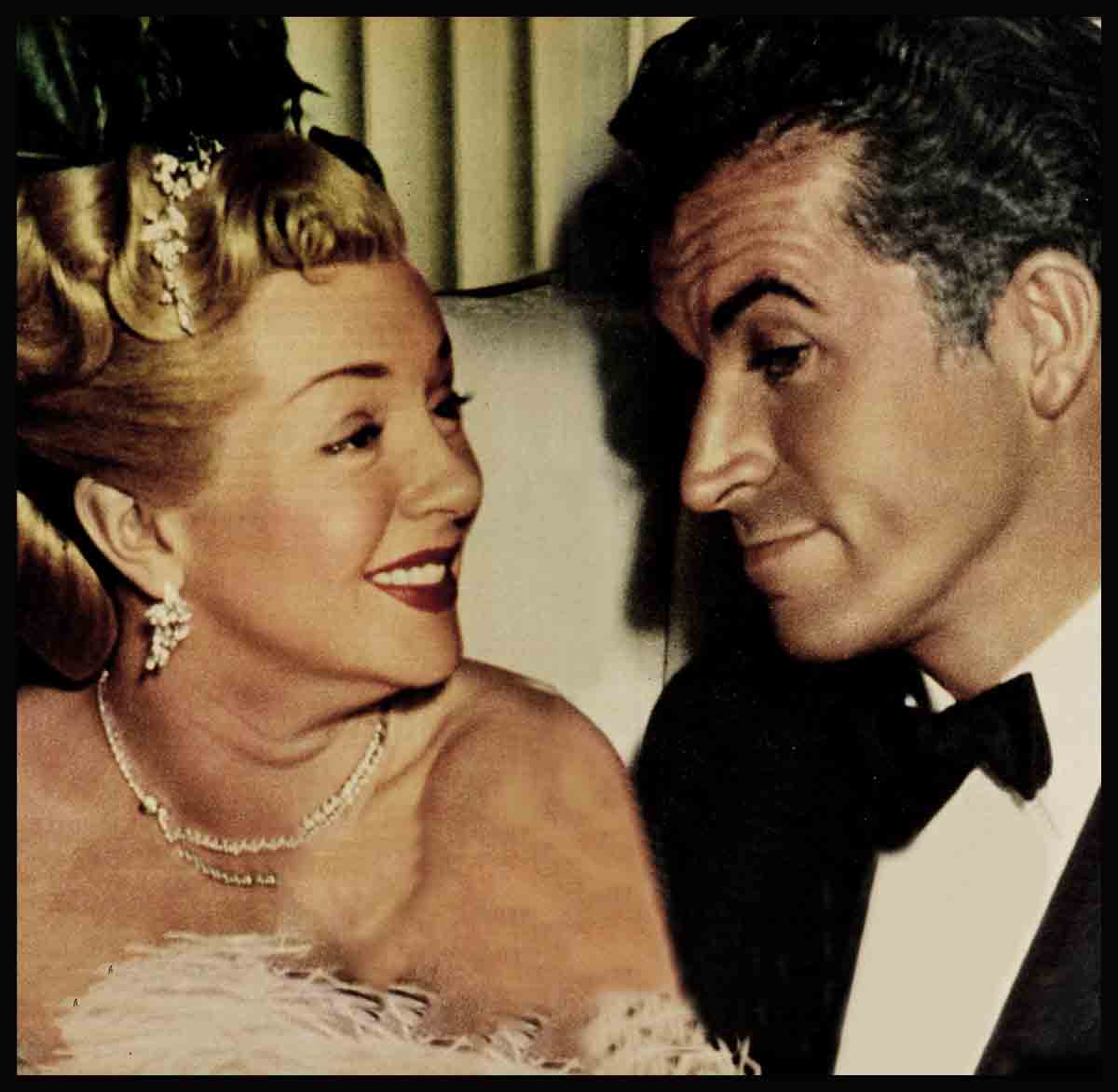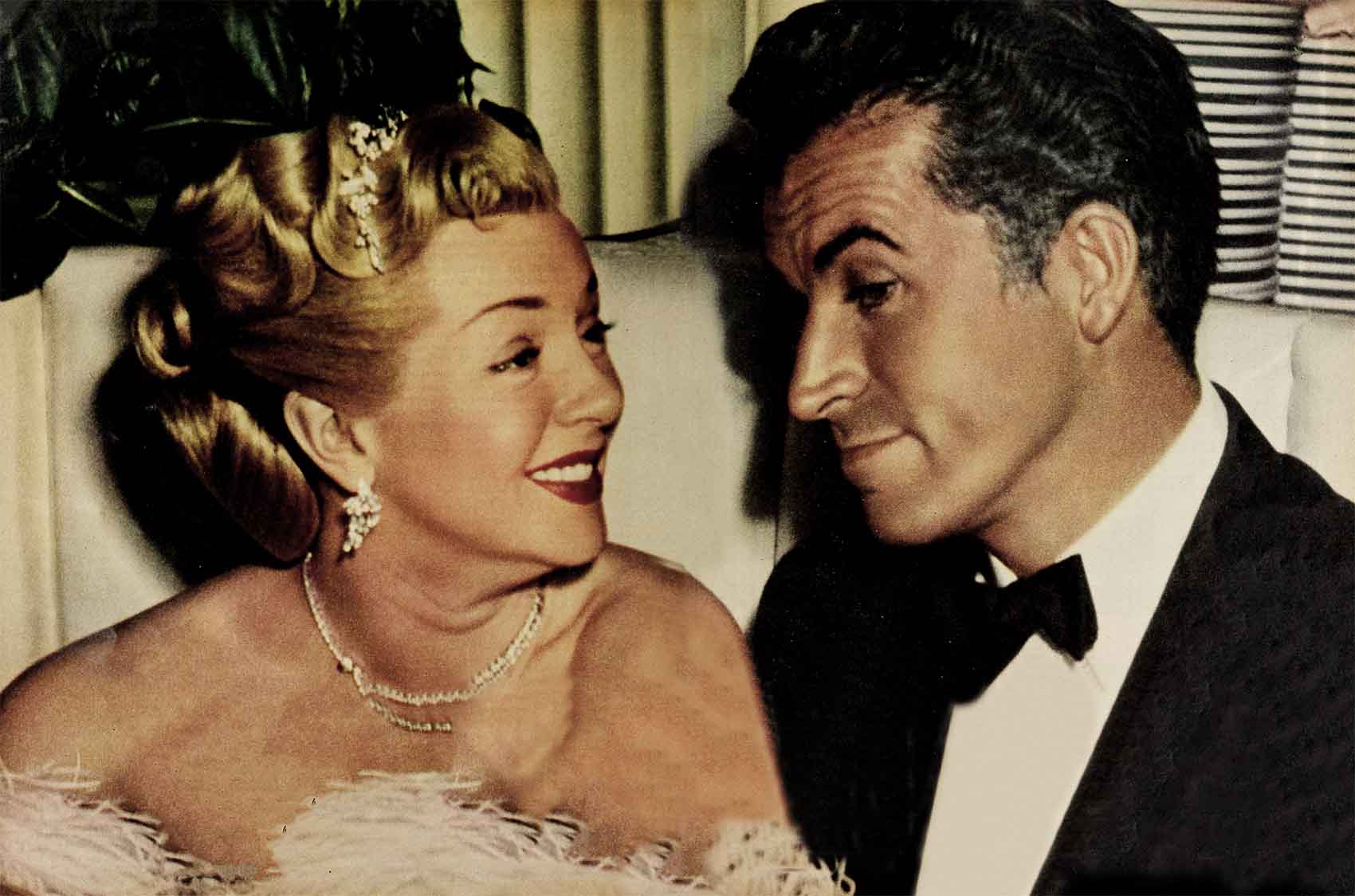
Lana’s Latin Lover—Lana Turner & Fernando Lamas
When they’re making a picture, actresses work six days a week and rest on Sunday so that on Monday the camera can accurately record their perfect loveliness.
After resting for six consecutive Sundays during the filming of The Merry Widow, Lana Turner decided that on the seventh Sunday she’d celebrate. When Turner celebrates, there is nothing halfway about it. On this particular Sunday, she chartered a DC-3 and flew her whole gang to Tijuana, Mexico, for an exciting afternoon at the bull fights.
When the last bull had been killed, Lana, logically enough, went out with Antonio Velasquez, the chief matador.
Reporters asked Lana if Antonio were her latest heart interest, and the beautiful blonde answered with a smile. “Boys,” she said, “you have the wrong Bull of the Pampas.”
What Lana meant was that the right Bull of the Pampas was (and is) Fernando Lamas, her tall, dark and handsome leading man in The Merry Widow. Lamas and Lana are supposedly very much taken with each other. Fernando seems to be helping her forget about Bob Topping, and Lana is helping Fernando forget about the estranged wife he left behind in Argentina.
It’s a cozy romance which began last November quite by accident. . . .
Curt Bernhardt, director of The Merry Widow, had signaled the sound man to play a Strauss waltz. He had also ordered Lamas to take Lana in his arms and begin to dance. Fernando executed the orders, but a little too ardently.
“Cut!” Bernhardt called. “Let’s do it again. Only this time, Fernando, take it easy.”
Fernando grinned, “I’m sorry,” he said. He turned to Lana. “I’m really very sorry.”
Lana laughed, “Think nothing of it.”
So they did the scene again, Fernando behaving like a perfect gentleman, and it was a “take.” Bernhardt called a break for lunch and Lana ambled off to her dressing room where two of her friends were waiting.
“Did you catch it?” she asked them.
“What?” one of her friends asked.
“That last scene,” Lana said. “The Bull of the Pampas just let himself go. I guess that’s the way he treats the girls in Argentine.”
The treatment seemed to please Lana who realized now that Fernando was finding her increasingly fascinating. And ever since Bob Topping walked out on her and began to see a lot of June Horne, Jackie Cooper’s ex-wife, Lana’s ego has been in need of bolstering.
They say that nothing is better for a girl’s morale than a romantic Latin lover—and that certainly is what Fernando Lamas is.
He and Lana have been going everywhere together—previews, nightclubs, private parties. Jaded Hollywood skeptics consider the romance studio-inspired, a publicity buildup for Lamas, but seeing these two in action makes you doubt it. Knowing their backgrounds convinces you that it isn’t need of publicity, but need of each other that has drawn them together.

Lana fears loneliness, and Fernando fears failure.
Fernando Lamas is in his early thirties. He was born in Buenos Aires, Argentina, and was orphaned at the age of five. He was raised by his grandparents and had his first taste of fame when he won the South American free style swimming championship in 1937. After that, he was given a job on radio and eventually got on the stage.
He made 20 films in Buenos Aires before he was brought to Hollywood to complete the Spanish version of a Republic picture. The executives at Republic didn’t think too much of his talent; and in view of the fact that he could hardly speak English, he wasn’t offered a contract.
His agent, though, knew that L. B. Mayer had a soft spot for singers (in any language) and took him over to MGM. Lamas sang, and Mayer reacted. Although Fernando didn’t know what Mayer was talking about, he did understand about signing a contract.
“My first year in Hollywood,” Fernando says, “I spent most of my time learning the language, taking lessons, singing at benefits, things like that.”
When the studio felt that Fernando was intelligible, he was given a leading role opposite Jane Powell in Rich, Young And Pretty. Then he was cast in The Law And The Lady with Greer Garson. A few months ago he was advanced enough to warrant co-starring with Lana in The Merry Widow.
Fernando has been advised to say nothing about his wife or his South American love-life, and he sticks to this admonition.
However, he does admit-having a wife and since she and he are Catholic, a divorce ray be out of the question.
Fernando doesn’t say much about Lana, either. He sums up the way he feels like this: “most beautiful, talented, and charming woman I have ever met. I think she’s wonderful, and I’m very fond of her.” All of which is nice but not very informative.
Come right out and ask him: “Are you in love with Miss Turner?” and he says, “But we are still both married.”
Lana is much more secure in her fame and much more outspoken. “The Bull of the Pampas is a very mice guy,” she says, “and a very good escort. But let me get over the last case of love before I start looking for more trouble. It’s enough to say that Fernando and I are just going out for a little companionship.”
Lana’s friends say that she cares very deeply for a mysterious man at the studio who sends one yellow rose to her dressing room each morning. With the rose comes a card that bears the romantic greeting, “Good morning, Lana!”
Some people say the rose comes from Lamas. Others say it’s from Curt Bernhardt. Lana herself refuses to reveal the rose-sender’s identity.
Whatever romance there is for her in Hollywood, Lana seems more determined than ever to get away from the west coast.
“In 1952,” she’s said, “I want to spend a lot of time abroad. I want to go all over Europe. I’ve got to get out of this town. I was in Europe on my honeymoon, but I wasn’t feeling very well, and I didn’t have too good a time. Now, I really want to see the place and enjoy myself.”
Actually at this point, Lana is the victim of mixed emotions. She’s confused and doesn’t know quite what to do at this point.
She thinks that getting away from Hollywood will take her away from her problems, but they lie within herself, and will go with her everywhere until she herself, changes.
Lana wants quite frankly to play the field, to date many men and fall in love with none. But in Lana’s case this is almost impossible. If she goes out with the same man three or four times, she falls in love with him. That’s why so many columnists insist that she has fallen for Fernando Lamas, the man for whom she bounced Cy Howard.
But Lamas looks like a dead end. Religion is the stumbling block.
Thus by going out with Lamas, Lana runs the risk of loving a man who can’t control his own marital destiny, a situation that may bring her only heartache.
Lana has the uncanny faculty of falling in love with those gentlemen who can hurt her the most. There is no actress who has suffered more in her search for love. When Lana gives her friendship, she gives it wholeheartedly, she can’t help herself. Because she is aware of her impetuous nature, she has tried to make it legally impossible for herself to marry again quickly. Instead of having her lawyers draw, up divorce papers she announced that she wanted a legal separation from Topping. “I want some time,” she said, “to take it easy, to think things out. Europe would be a good spot. I’d get away from all these hassels and pressures.”
With Lamas as her escort she’s safe in one respect: He can’t talk in terms of marriage.
But what about love and happiness and career—the three most vital factors in Lana’s life after the welfare of her daughter, Cheryl?
Lana’s career has been foundering ever since 1948. She needs a good picture—maybe The Merry Widow is it. If it isn’t, Lana will probably leave MGM. She has been stalling about signing a new contract until the film is released.
It may be that some wealthy lover will come along and marry her. Then Lana would probably give up her career in a jiffy. In her mind, marriage and children have always been more important than film fame, even though three husbands have brought her none of the domestic tranquillity she values so highly.
Maybe some dashing, foreign Romeo will do the trick. It may be Fernando Lamas and it may be someone else. But until she finds the right man, Lana Turner is marking time.
She may mark time for a week or two, but in the months to come when the reports of her European jaunt start filtering back, Lana will not be mentioned alone.
Somehow, wherever Lana Turner is—men of all nationalities appear in droves. Her magnetism, apparently, is universal.
THE END
BY M. SAUNDERS
It is a quote. MODERN SCREEN MAGAZINE MARCH 1952




